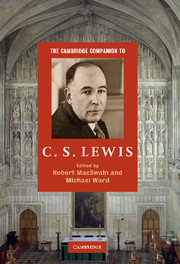21 - Poet
from Part III - Writer
Published online by Cambridge University Press: 28 November 2010
Summary
The range and depth of Lewis's engagement with poetry as a scholar and critic is undisputed. The Allegory of Love and A Preface to Paradise Lost continue to serve as widely read authoritative guides to understanding and enjoying the best of medieval and Renaissance poetry. Their style, lucidity and sheer wealth of illustration give glimpses of a richly furnished mind, passionate about both the substance and technique of poetry. Lewis's own efforts as a poet, by contrast, are barely known and have received little scholarly attention. There is only one substantial book on his verse and a small tally of articles or chapters in the massive secondary literature on Lewis. In the best of these, which contains fine analyses of a number of Lewis's poems, Charles Huttar writes: 'By age 30 it appears Lewis had . . . settled for the rank, in poetry, of a minor figure. Barring a major revolution in taste, he will never be accorded a higher position.' The time has come to revisit this judgement, made many years ago, and to look afresh at Lewis's poetic output. Was this great exponent of the art of poetry in others himself only a minor versifier? In this chapter I propose to revise our assessment of Lewis by re-examining his supposed antipathy to T.S. Eliot and modernism, which has hitherto excluded him from consideration as a successful modern poet, and by re-reading his poetry in four other contexts which have assumed new importance in the years since his death and which may hint at just such a 'revolution of taste' as Huttar bars from the reckoning.
- Type
- Chapter
- Information
- The Cambridge Companion to C. S. Lewis , pp. 294 - 310Publisher: Cambridge University PressPrint publication year: 2010

